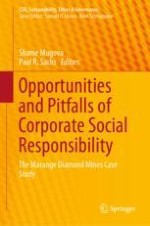2019 | OriginalPaper | Chapter
Environmental Impact and CSR Responsibilities
Authors : Steven Kayambazinthu Msosa, Jeevarathnam P. Govender
Published in: Opportunities and Pitfalls of Corporate Social Responsibility
Publisher: Springer International Publishing
Activate our intelligent search to find suitable subject content or patents.
Select sections of text to find matching patents with Artificial Intelligence. powered by
Select sections of text to find additional relevant content using AI-assisted search. powered by
